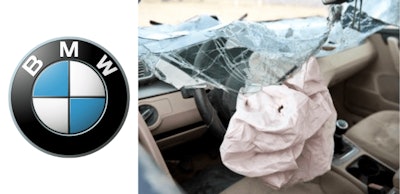
Toronto, Ontario — On Monday, the National Highway Traffic Safety Administration (NHTSA) said that it is monitoring data from a group of mostly unrecalled Takata airbag inflators after recent incidents.
Specifically, the NHTSA declared its continued investigation into Takata airbags after one exploded in a BMW and hurled metal fragments that seriously injured a driver in Chicago.
The NHTSA has been investigating the batch of approximately 30 million inflators since 2021 with the intention to see if they exhibit the same traits that has forced Takata to recall 67 million of the devices since 2001.
This investigation covers more than 30 million inflators in over 200 models from 20 car and truck makers, including Honda, Stellantis, General Motors, Ford, Nissan, Tesla, BMW, Toyota, Jaguar Land Rover, Daimler Vans, Mitsubishi, Subaru, Mercedes-Benz, Ferrari, McLaren, Porsche, Mazda, Karma, Fisker, Spartan Fire vehicles.
At least 26 people have been killed in the U.S. by Takata inflators since May 2009, and at least 30 have died worldwide including people in Malaysia and Australia. In addition, about 400 people have been injured. The exploding air bags sent Takata of Japan into bankruptcy.
Takata used volatile ammonium nitrate to create a small explosion to inflate air bags in a crash. But the chemical propellant can deteriorate over time when exposed to high temperatures and humidity. It can explode with too much force, blowing apart a metal canister and spewing shrapnel.
Separate from the recalled Takata inflators are about 30 million that contain a moisture-absorbing chemical called a desiccant that is meant to keep the ammonium nitrate dry and stable.
The potential for a dangerous malfunction led to the largest series of auto recalls in U.S. history. About 100 million inflators were recalled worldwide.
In an earlier press release, BMW blamed the ruptured inflator on a welding defect that occurred during manufacturing and said it is limited to a small number of inflators. The automaker said the problem is in “contrast to previous recalls related to Takata airbag gas generators in which the aging of the propellant was the issue.” However, safety regulators are still investigating key causes in this instance.
In its statement made on Monday, the NHTSA said that it “continues to closely monitor all air bag inflator issues and will take action if a safety defect is identified.”
BMW said in documents posted Saturday that it will be recalling 486 X3, X4 and X5 SUVs from the 2014 model year as a preliminary precautionary measure. Affected owners will be notified via letter starting January 16 and will be able to get their airbags replaced free of cost.























